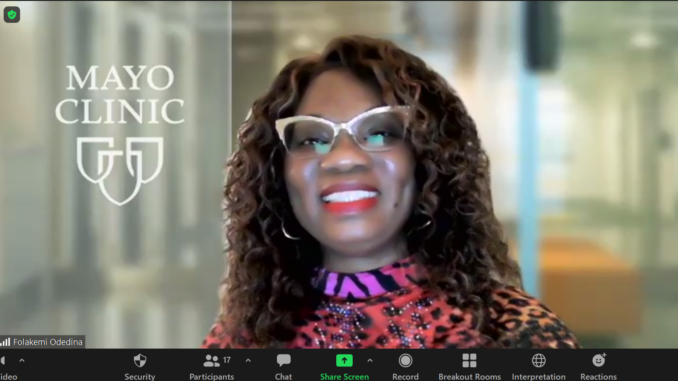
On November 10-13th, Mayo Clinic hosted the 6th Biennial Science of Global Prostate Cancer Disparities in Black men virtual Conference. The theme was the Science of Survivorship (S.O.S): Eliminating Prostate Cancer Disparities in Black Men Globally and included multidisciplinary, citizen scientist, survivor, and advocate speakers from across the world. Institutions represented included Mayo Clinic, the National Institutes of Health (NIH), the National Cancer Institute (NCI), the American Society of Clinical Oncology (ASCO), The Cancer Society of the Bahamas, US Army Medical Research & Development Command, Project Pink Blue, among many others. Audiences were in multiple countries including hubs with translational services offered so that there was a representation of a global voice for championing prostate cancer research efforts. Funded by the NCI Center for Global Health, the Biennial conference was co-organized with several other entities including the Prostate Cancer Transatlantic Consortium (CaPTC) and the African-Caribbean Cancer Consortium (AC3) in cooperation with the Mayo Clinic Cancer Center.
In 2010, the Prostate Cancer Transatlantic Consortium (CaPTC) launched the Biennial Science of Global Prostate Cancer Disparities (SGCaPD) in Black men Conference in Jacksonville, Florida. Funded by the US National Cancer Institute and co-organized by the African-Caribbean Cancer Consortium and multiple institutions and organizations, the conference has employed a unique approach to understand and address prostate cancer disparities through team science initiatives resulting in several scholarly achievements, including: (1) proceedings publications; (2) a global prostate cancer special issue in ecancermedicalscience; (3) multi-institutional grant collaborations; (4) multi-institutional, trans-disciplinary prostate health disparity projects; (5) global prostate cancer advocacy initiatives; (6) research guidelines; and (7) a standardized global CaPTC-AC3 Behavioral and Epidemiological (CABE) data elements and measures that are culturally appropriate for studying prostate cancer in Black men globally. The CABE measures are currently being used as standard data collection tools in multiple countries globally.
Building on the successes of the previous biennial conferences, the goals of this year’s conference were to:
- Provide opportunities for mutual learning, knowledge transfer, and collaborations among prostate cancer scientists, clinicians, patients, survivors, advocates and policy makers;
- Promote trans-disciplinary and multi-disciplinary prostate cancer research globally;
- Facilitate networking among individuals involved in all aspects of prostate cancer control, education, and research in Black men;
- Maintain our global community of practice to address common challenges in prostate cancer, including prevention, detection, diagnosis, treatment, and survivorship; and
- Contribute to a global impact against prostate cancer through research training and education programs for low-resource countries.
Mayo Clinic Center for Health Equity and Community Engagement leadership who organized logistics for the event, reported that the conference was an international success and the dialogue encouraged concrete next steps for collaboration between scientists, clinicians, and the community of survivors and advocates.

Be the first to comment